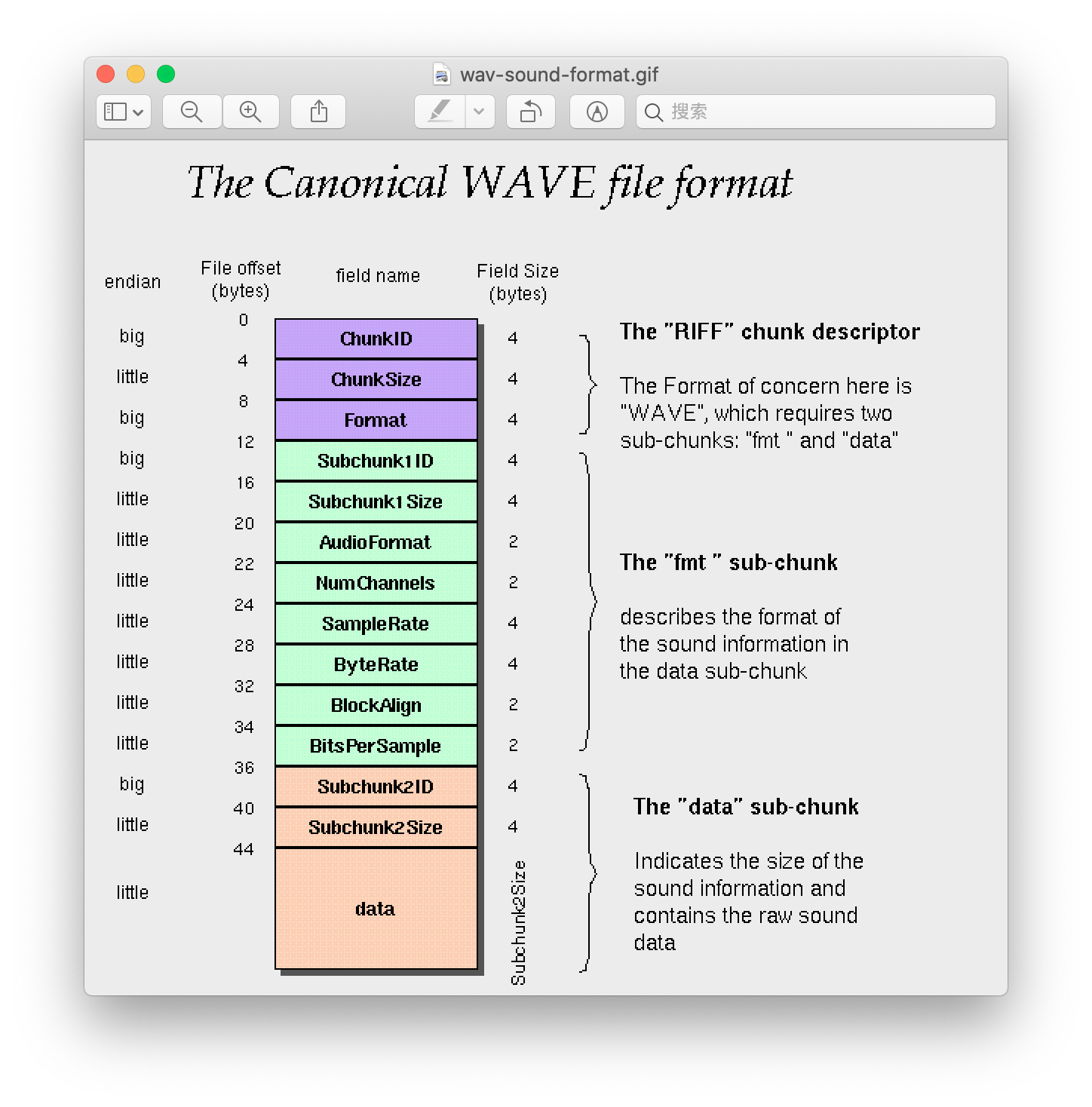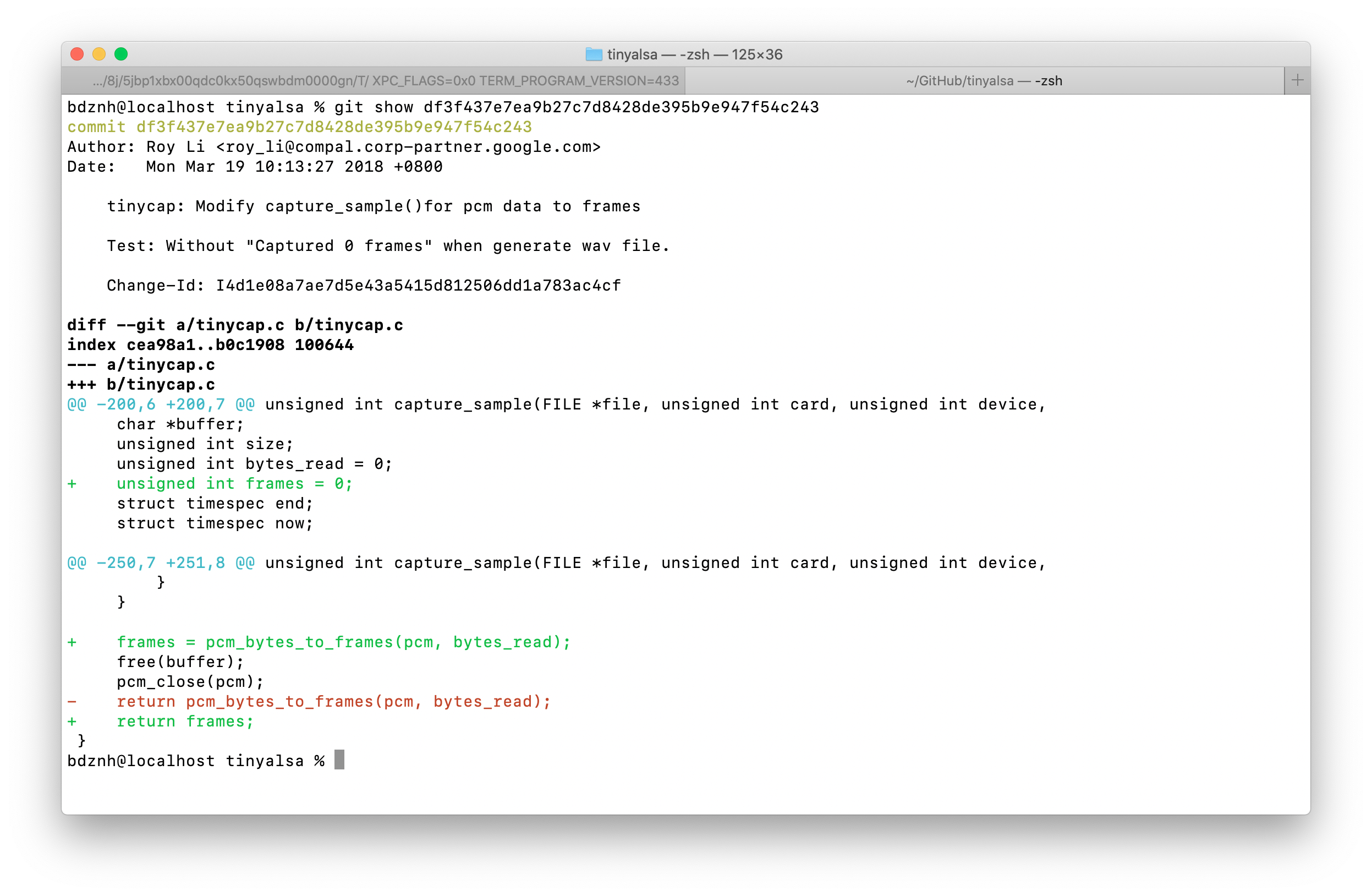1
2
3
4
5
6
7
8
9
10
11
12
13
14
15
16
17
18
19
20
21
22
23
24
25
26
27
28
29
30
31
32
33
34
35
36
37
38
39
40
41
42
43
44
45
46
47
48
49
50
51
52
53
54
55
56
57
58
59
60
61
62
63
64
65
66
67
68
69
70
71
72
73
74
75
76
77
78
79
80
81
82
83
84
85
86
87
88
89
90
91
92
93
94
95
96
97
98
99
100
101
102
103
104
105
106
107
108
109
110
111
112
113
114
115
116
117
118
119
120
121
122
123
124
125
126
127
128
129
130
131
132
133
134
135
136
137
138
139
140
141
142
143
144
145
146
147
148
149
150
151
152
153
154
155
156
157
158
159
160
161
162
163
164
165
166
167
168
169
170
171
172
173
174
175
176
177
178
179
180
181
182
183
184
185
186
187
188
189
190
191
192
193
194
195
196
197
198
199
200
201
202
203
204
205
206
207
208
209
210
211
212
213
214
215
216
217
218
219
220
221
222
223
224
225
226
227
228
229
230
231
232
233
234
235
236
237
238
239
240
241
242
243
244
245
246
247
248
249
250
251
252
253
254
255
256
257
258
|
#include <tinyalsa/asoundlib.h>
#include <stdio.h>
#include <stdlib.h>
#include <stdint.h>
#include <signal.h>
#include <string.h>
#include <time.h>
#define ID_RIFF 0x46464952
#define ID_WAVE 0x45564157
#define ID_FMT 0x20746d66
#define ID_DATA 0x61746164
#define FORMAT_PCM 1
struct wav_header {
uint32_t riff_id;
uint32_t riff_sz;
uint32_t riff_fmt;
uint32_t fmt_id;
uint32_t fmt_sz;
uint16_t audio_format;
uint16_t num_channels;
uint32_t sample_rate;
uint32_t byte_rate;
uint16_t block_align;
uint16_t bits_per_sample;
uint32_t data_id;
uint32_t data_sz;
};
int capturing = 1;
unsigned int capture_sample(FILE *file, unsigned int card, unsigned int device,
unsigned int channels, unsigned int rate,
enum pcm_format format, unsigned int period_size,
unsigned int period_count, unsigned int cap_time);
void sigint_handler(int sig __unused)
{
capturing = 0;
}
int main(int argc, char **argv)
{
FILE *file;
struct wav_header header;
unsigned int card = 0;
unsigned int device = 0;
unsigned int channels = 2;
unsigned int rate = 44100;
unsigned int bits = 16;
unsigned int frames;
unsigned int period_size = 1024;
unsigned int period_count = 4;
unsigned int cap_time = 0;
enum pcm_format format;
if (argc < 2) {
fprintf(stderr, "Usage: %s file.wav [-D card] [-d device]"
" [-c channels] [-r rate] [-b bits] [-p period_size]"
" [-n n_periods] [-T capture time]\n", argv[0]);
return 1;
}
file = fopen(argv[1], "wb");
if (!file) {
fprintf(stderr, "Unable to create file '%s'\n", argv[1]);
return 1;
}
argv += 2;
while (*argv) {
if (strcmp(*argv, "-d") == 0) {
argv++;
if (*argv)
device = atoi(*argv);
} else if (strcmp(*argv, "-c") == 0) {
argv++;
if (*argv)
channels = atoi(*argv);
} else if (strcmp(*argv, "-r") == 0) {
argv++;
if (*argv)
rate = atoi(*argv);
} else if (strcmp(*argv, "-b") == 0) {
argv++;
if (*argv)
bits = atoi(*argv);
} else if (strcmp(*argv, "-D") == 0) {
argv++;
if (*argv)
card = atoi(*argv);
} else if (strcmp(*argv, "-p") == 0) {
argv++;
if (*argv)
period_size = atoi(*argv);
} else if (strcmp(*argv, "-n") == 0) {
argv++;
if (*argv)
period_count = atoi(*argv);
} else if (strcmp(*argv, "-T") == 0) {
argv++;
if (*argv)
cap_time = atoi(*argv);
}
if (*argv)
argv++;
}
header.riff_id = ID_RIFF;
header.riff_sz = 0;
header.riff_fmt = ID_WAVE;
header.fmt_id = ID_FMT;
header.fmt_sz = 16;
header.audio_format = FORMAT_PCM;
header.num_channels = channels;
header.sample_rate = rate;
switch (bits) {
case 32:
format = PCM_FORMAT_S32_LE;
break;
case 24:
format = PCM_FORMAT_S24_LE;
break;
case 16:
format = PCM_FORMAT_S16_LE;
break;
default:
fprintf(stderr, "%u bits is not supported.\n", bits);
fclose(file);
return 1;
}
header.bits_per_sample = pcm_format_to_bits(format);
header.byte_rate = (header.bits_per_sample / 8) * channels * rate;
header.block_align = channels * (header.bits_per_sample / 8);
header.data_id = ID_DATA;
fseek(file, sizeof(struct wav_header), SEEK_SET);
signal(SIGINT, sigint_handler);
signal(SIGHUP, sigint_handler);
signal(SIGTERM, sigint_handler);
frames = capture_sample(file, card, device, header.num_channels,
header.sample_rate, format,
period_size, period_count, cap_time);
printf("Captured %u frames\n", frames);
header.data_sz = frames * header.block_align;
header.riff_sz = header.data_sz + sizeof(header) - 8;
fseek(file, 0, SEEK_SET);
fwrite(&header, sizeof(struct wav_header), 1, file);
fclose(file);
return 0;
}
unsigned int capture_sample(FILE *file, unsigned int card, unsigned int device,
unsigned int channels, unsigned int rate,
enum pcm_format format, unsigned int period_size,
unsigned int period_count, unsigned int cap_time)
{
struct pcm_config config;
struct pcm *pcm;
char *buffer;
unsigned int size;
unsigned int bytes_read = 0;
unsigned int frames = 0;
struct timespec end;
struct timespec now;
memset(&config, 0, sizeof(config));
config.channels = channels;
config.rate = rate;
config.period_size = period_size;
config.period_count = period_count;
config.format = format;
config.start_threshold = 0;
config.stop_threshold = 0;
config.silence_threshold = 0;
pcm = pcm_open(card, device, PCM_IN, &config);
if (!pcm || !pcm_is_ready(pcm)) {
fprintf(stderr, "Unable to open PCM device (%s)\n",
pcm_get_error(pcm));
return 0;
}
size = pcm_frames_to_bytes(pcm, pcm_get_buffer_size(pcm));
buffer = malloc(size);
if (!buffer) {
fprintf(stderr, "Unable to allocate %u bytes\n", size);
free(buffer);
pcm_close(pcm);
return 0;
}
printf("Capturing sample: %u ch, %u hz, %u bit\n", channels, rate,
pcm_format_to_bits(format));
clock_gettime(CLOCK_MONOTONIC, &now);
end.tv_sec = now.tv_sec + cap_time;
end.tv_nsec = now.tv_nsec;
while (capturing && !pcm_read(pcm, buffer, size)) {
if (fwrite(buffer, 1, size, file) != size) {
fprintf(stderr,"Error capturing sample\n");
break;
}
bytes_read += size;
if (cap_time) {
clock_gettime(CLOCK_MONOTONIC, &now);
if (now.tv_sec > end.tv_sec ||
(now.tv_sec == end.tv_sec && now.tv_nsec >= end.tv_nsec))
break;
}
}
frames = pcm_bytes_to_frames(pcm, bytes_read);
free(buffer);
pcm_close(pcm);
return frames;
}
|


